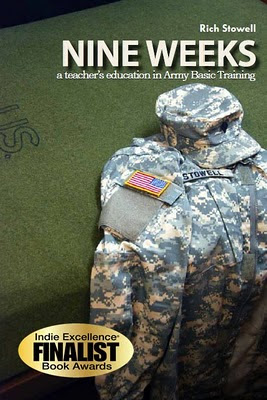If you know me at all, then you know I have written a lot about Army Basic Training. In fact, I wrote an entire book.
It's called,
Nine Weeks: a teacher's education in Army Basic Training, and it's now available on Amazon.

It was a labor of love, in more ways than one. First, it represents two things I am very proud of: being a Soldier and being a teacher. Second, it has been a joint project with my wife and has helped her to understand what I have gone through as a Soldier and helped me realize how amazing she is.
I would like to offer you an insider's view of the book, in hopes that you will want to read more.
A funny story:
During our final inspection, one unfortunate private actually fell asleep at parade rest. He crashed into the bunk facing him and disrupted whatever slim chances we had of winning that inspection. The sad part was that, after nine weeks, we were still as bored as ever, and that solemn moment when our first sergeant was determining our worthiness to go into battle, this young man said to himself, "screw it, I'm taking a nap."
An emotional experience:
To make more acute the pain of being away from my wife longer than I ever had was our first wedding anniversary, which came during my third week at Basic. Drill Sergeant Jackson took pity on me, and offered me unlimited time on our phone call on my anniversary day. When the phone call came, I monitored everyone else and went last. After 11 minutes of blathering on to my wife, I ended the call. There seemed nothing to talk about, like a final call before a death sentence. Jackson showed his compassion, however. He had been there before, and he understood that I couldn't function properly at Basic without a solid relationship with my sweetie.
A learning story:
As we paced around tents at our mock forward operating base, sleep nearly suffocated us. We had got less than six hours of sleep over the past 45, and the entire platoon marched with rifles ready in the black of the night. It was scary at the time, infuriating. In hindsight comical. But I realized at that moment that these were merely games, devious ways the drill sergeants tested us. It might have been silly, but real personal growth could take place during those times. I learned patience and forgiveness.
Something that wasn't in the book:
I had to cut a lot out. Basic Training was so much more than a series of stories, but books have limits. One thing I had to scrap was the time when Drill Sergeant Robertson ordered two Soldiers from another platoon to come and do exercises in front of us as we practiced our combatives. Then, he ordered them to drink unconscionable amounts of water until they threw up all over our floor. We felt for these guys, but our desire for vengeance against other platoons had to be quenched. And even though we all knew our drill sergeant was being abusive, we took some sort of perverted pleasure in it.
You'll have to buy the book to learn about the Code Red.
So get to know me a little bit, and check out
Nine Weeks. Post a comment after you have gone to Amazon. I'm checking up on you.














